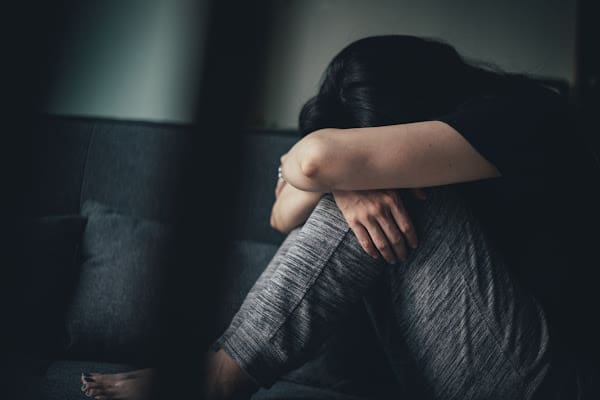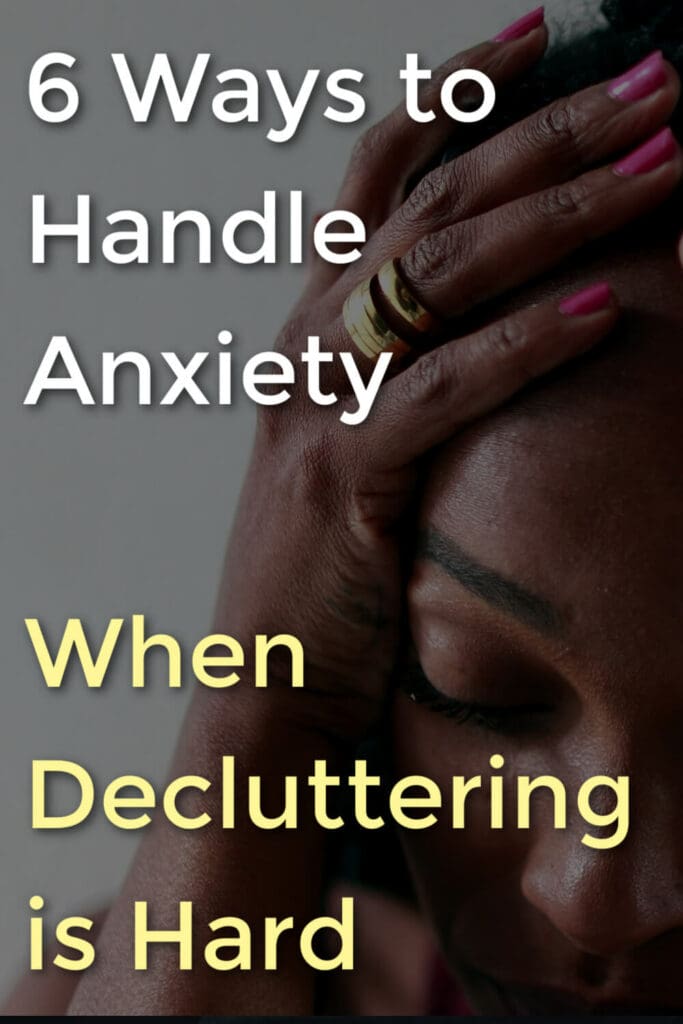6 Ways to Handle Anxiety When Decluttering is Hard

Does anxiety rear its ugly head every time you have to make a tough decision?
And you want to declutter, but decluttering is full of decisions, so it can feel very defeating.
How do we make progress when the anxiety makes everything feel as if we should keep it?
Follow the fear to the end
First, name the fear.
What do I think will happen if I get rid of this item?
What is it you are actually afraid of?
I feared throwing away receipts, paid bills, and owner’s manuals.
But was it logical?
What would happen if I threw away that receipt from Target? Or the statement on that bill that was already paid? Or the owner’s manual from the toaster and the vacuum cleaner?
And the answer: nothing.
The Target shopping trip was mostly groceries, I wasn’t going to be returning anything.
The cable company didn’t care if I threw away the statement- they only cared that I paid it.
And I never needed to open the manual for the toaster or vacuum, they were base models, once I figured out how to turn them on, I was set.
Ask: Is it true?
Let’s say it’s a salad bowl that my mom gave me.
But I have 5 other salad bowls, so I know I don’t need all of them.
I have a fear that my mom would be upset if she found out I got rid of her old salad bowl.
But is that true?
NO.
My mom wasn’t attached to that salad bowl. She doesn’t miss it and doesn’t think about it anymore.
AND my mom is kind and gentle, she’s never been one to yell, cry or have any sort of dramatic reaction.
So, it is definitely NOT true.
Know that the feelings will pass
According to Harvard brain scientist Dr. Jill Bolte Taylor, it takes 90 seconds to have an emotion, identify it and choose to diffuse it.
Yes, we’re going to feel.
Our brains try so hard to keep us safe and if something isn’t “normal” for us, then there are going to be automatic responses in our brains that say “We better not do that – it doesn’t feel safe.”
But it’s ok – we can identify the emotion and determine if we want that emotion to dictate how we make our decision. Which basically means we can retrain our minds.
Many of those feelings will be strong, and we can have a physical response as well – racing heart, sweating, rapid breathing, trembling… but they will all subside if we just wait 90 seconds.
It helps to identify what feeling you are having.
Much like the first point of identifying what we’re afraid of, it’s important to identify the main feeling that comes up: is it fear, sadness, anger, jealousy, hurt, embarrassment, disappointment?
Is it true?
And what would happen if you got rid of that item?
Can you imagine those unpleasant feelings leaving the house as the item leaves the house?
Small steps make the change
Pretty much all of us know the changes that should be made. We know we have things to get rid of, but it all seems overwhelming.
Generally, it’s because we see all of it at once and it’s hard to break it down into doable chunks.
And we feel so defeated, it seems silly to spend 5 minutes staring at piles of stuff and only making one decision.
But that’s what it takes!
One decision.
And then another decision.
And starting out small when the task is overwhelming is what we have to do.
If we make one decision a day for a month – that’s 30 decisions. And we will be in a better place.
If we continue, we can make significant progress in a year.
Yes, it can seem like slow progress. But it is STILL progress.
Getting started is the hardest, so once it’s started, it’s easier to spend more time and make more decisions. Everything always starts with one small step.
Nutritional helps
Please know that I am not a medical professional in any way, and I recommend you seek a professional opinion before making changes related to your health.
Remember that most health changes don’t create immediate results, and if you have severe mental health struggles, it can make a difference to turn to prescription medication. Many times we need medication to help get us into a good mental place so we can make the physical changes we need, and then we can work our way off the prescriptions if we prefer a natural route.
Magnesium has seemed to improve my mood and sense of well-being. I use Standard Process E-Z Mg™️. After a few weeks of taking it, I realized that I was in a much better place mentally. I was willing to do more with the kids, and felt like I was enjoying life more.
A whole-food B complex has made a difference for Brian and a couple of our kids. So much so, one of our sons had a complete meltdown when I asked him to throw away his worn-out pants, (I did not force him to throw them away, I am not willing to risk trauma to declutter the way I want to), 6 months later after taking a B complex daily, he decided on his own without me even asking him about the pants, to throw away. He is the one that struggles with anxiety more than the rest of us, it was a wonderful moment.
We use MegaFood Balanced B Complex. But there is so much information available for B vitamins and our need for food-based vitamins. I would start by researching the MTHFR gene mutation, Wellness Mama has an in-depth article on it here.
Diet. I strive to follow a more real food diet, but along the way, I have learned so much about different diets and their health benefits.
For a year or so, we followed the GAPS diet, which is basically grain-free and sugar-free. I felt wonderful on that diet and think my body responded the best to that one. I functioned best on red meats and veggies.
Brian, on the other hand, does better with following the blood-type diet. He does best with lots of veggies, fish and chicken.
Regardless of what path you choose for your diet, cutting out processed food and sugar can have a huge impact on mental health. When our gut is happy, our brain is happy.
Tea. Our son Stephen works at a local tea shop, Boston Harbor Tea, and has become well-versed in the health benefits of tea. He started me drinking Passion Flower tea, as it helps give a sense of calm, and I found it makes a difference.
Exercise. I remember when struggling with PPD my dr. begged me to exercise. She said it’s often just as effective, and sometimes more effective than prescription medication. There are so many studies on even the benefit of walking in the fresh air – yes, sunshine is great, but even if it’s raining or snowing, there is a benefit to being outdoors.
Decision fatigue
This isn’t necessarily anxiety, but often we can mistake decision fatigue FOR anxiety.
You know the times when you’re decluttering, making good progress and then about an hour into it you find yourself shuffling and creating piles? No real reason for the piles – most of them are “decide on later” piles. But you’re determined to finish sorting this box, so you keep going.
When you get to the end of the box you have the donation/trash things that you decided on in the beginning, but then there are 4 other piles of “decide on later.”
The mess is way more than you bargained for and you leave the room with feelings of exhaustion and not knowing how you will ever conquer this decluttering.
It seems like a good thing to push ourselves to finish the task, but the truth is, we can’t force ourselves to make decisions when we hit decision fatigue.
It simply doesn’t work.
Instead, when you notice decisions aren’t being made, just stop. If your donation box and trash are full, remove them from the area and tidy up what you can. Find something else to do.
You can start again the next day and make progress again.
We all face this! And don’t worry the more you declutter, the stronger your decision-making-muscles will get. Which means at some point you will be able to sort through an entire box in one sitting.
But it’s normal if that doesn’t happen from the beginning. Be gentle with yourself.


Thank you for the reminder about decision-fatigue vs. anxiety. It is easy to confuse these two. My brain knows when I need to be “done for now” and will pop up all kinds of red flags if I’m not paying attention.
I try to plan small-space decluttering, then a cup of tea or a walk outside, before another small-space session. Typically I get more done with the break in between, than attempting a bigger space at one time, which triggers decision fatigue.
My problem is getting started AT ALL despite my best intentions. Yesterday my therapist suggested that I reflect upon “What am I avoiding?” I have not done so yet.
When I was a kid, we would say, “Mom isn’t cleaning house; she’s ‘shifting piles.'”
Thank you for the information as I’m trying to declutter and find it overwhelming at times so I quit. This hopefully will get me started again. I’m disabled and have a hard time doing anything.